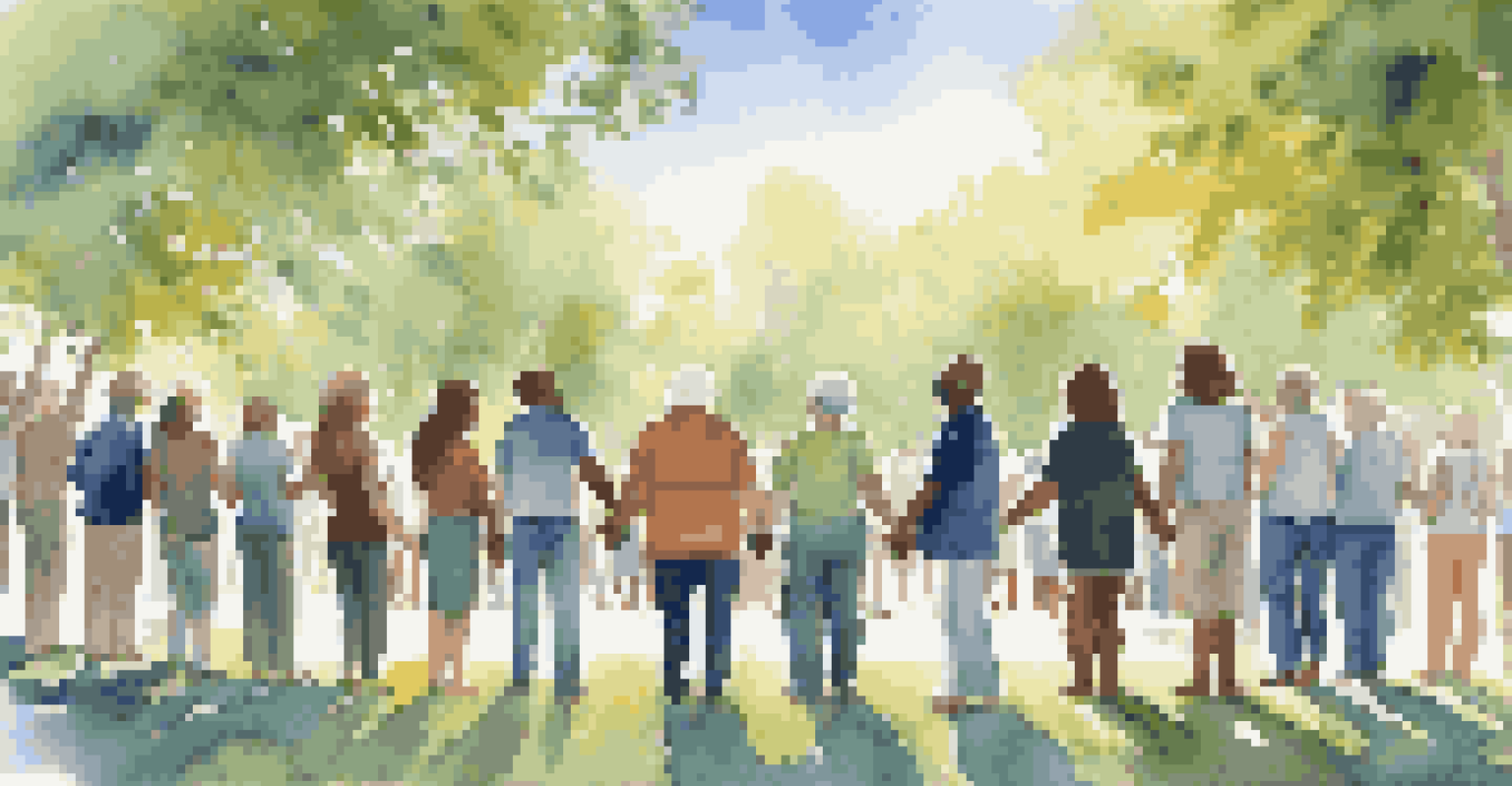The Influence of Music on Collective Action in Social Movements

Understanding Music's Role in Social Movements
Music has played a pivotal role in social movements throughout history. It serves as a medium for expressing shared emotions and aspirations, uniting individuals under a common cause. From protest songs to anthems, music can amplify messages and make them resonate with a broader audience.
Music is the shorthand of emotion.
In essence, music acts as a catalyst for collective action, encouraging individuals to participate and stand together. It can evoke feelings of hope, resistance, and solidarity, which are essential for mobilizing communities. By harnessing the power of music, movements can create a sense of belonging among participants.
Moreover, the rhythms and melodies of music can energize a crowd, transforming passive observers into active participants. This transformation is crucial for maintaining momentum in social movements, as it helps sustain enthusiasm and commitment to the cause.
Historical Examples of Music in Social Movements
Throughout history, we can see numerous examples where music played a significant role in social movements. For instance, during the Civil Rights Movement in the United States, songs like 'We Shall Overcome' became anthems that inspired hope and resilience among activists. These songs not only provided comfort but also encouraged people to join the fight for equality.

Similarly, the anti-apartheid movement in South Africa utilized music as a form of resistance. The song 'Nkosi Sikelel' iAfrika' became a rallying cry, symbolizing the struggle against oppression. This demonstrates how music can transcend cultural barriers and unify diverse groups under a shared mission.
Music Unites for Social Change
Music serves as a powerful tool to express shared emotions, mobilizing individuals under a common cause.
These historical instances highlight how music can encapsulate the spirit of a movement, creating a lasting legacy that continues to inspire future generations. They remind us that the power of music can be both profound and transformative in the context of social change.
The Emotional Impact of Music on Activists
Music has a unique ability to evoke strong emotions, which can be harnessed to motivate activists. When people listen to powerful songs, they often feel a surge of passion and determination that can propel them to take action. This emotional connection is vital for sustaining engagement in long-term movements.
The power of music makes all the difference in the world.
For example, songs that address themes of injustice and resilience can resonate deeply with individuals who have experienced marginalization. This connection fosters a sense of solidarity, reminding activists that they are not alone in their struggles. The emotional weight of music can thus strengthen their resolve.
Moreover, the collective experience of singing or listening to music together can create a powerful sense of community among activists. This shared emotional journey can reinforce their commitment to the cause, making them more likely to remain engaged and active.
Music as a Tool for Communication in Movements
In social movements, music serves as an effective communication tool that transcends language barriers. It can convey complex messages and emotions in a way that resonates with diverse audiences. This universality makes music an ideal vehicle for spreading awareness and garnering support.
For instance, protest songs often encapsulate the key messages of a movement, allowing them to be easily shared and remembered. Through catchy hooks and relatable lyrics, these songs can educate listeners about the issues at hand, fostering a greater understanding of the cause.
Historical Impact of Protest Songs
Throughout history, songs like 'We Shall Overcome' and 'Nkosi Sikelel' iAfrika' have inspired movements and fostered unity.
Additionally, in a digital age, music can be easily shared across various platforms, amplifying its reach. Movements can harness the power of social media to spread their anthems, creating a viral effect that draws in more supporters and keeps the conversation alive.
The Role of Music Festivals in Social Movements
Music festivals have become increasingly important venues for social movements, providing a platform for artists and activists to come together. These gatherings create a unique space where music and activism intersect, allowing messages of social change to be broadcast to large audiences. Festivals can energize participants and amplify the movement's goals.
For example, events like the Coachella Valley Music and Arts Festival have featured performances that address social justice issues, encouraging attendees to take action. By mixing entertainment with activism, these festivals can attract a diverse crowd and inspire them to engage with important causes.
The communal experience of a festival fosters a sense of unity among participants, reinforcing the idea that collective action can lead to meaningful change. This connection is vital for sustaining momentum in social movements and inspiring ongoing engagement.
Challenges in Using Music for Social Change
While music can be a powerful tool for social change, there are challenges to its effectiveness. One significant issue is the commercialization of protest music, which can dilute its original message. When songs become popularized for profit, they may lose their authenticity and connection to the movement's core values.
Additionally, not all music resonates with every audience. Different cultural backgrounds and personal experiences can affect how individuals relate to certain songs. This diversity can make it challenging to find a unifying anthem that speaks to all members of a movement.
Future of Music in Activism
The evolving digital landscape and new musical genres will shape how music continues to inspire social movements.
Furthermore, the fleeting nature of trends in music can mean that powerful messages are quickly forgotten. To counteract this, movements must work to ensure that their musical messages remain relevant and continue to inspire action over time.
The Future of Music in Social Movements
As we look to the future, the role of music in social movements is likely to evolve alongside technology and cultural shifts. With the rise of digital platforms, artists can reach wider audiences than ever before, making it easier for movements to disseminate their messages. This digital landscape opens up new avenues for collaboration and creativity.
Moreover, the emergence of new genres and styles may introduce fresh perspectives to social movements. For instance, hip-hop and rap have become powerful forms of protest music, addressing issues of systemic racism and inequality. These genres can resonate deeply with younger generations, inspiring them to engage with social causes.

Ultimately, the future of music in social movements will depend on its ability to adapt and respond to the changing social landscape. By continuing to harness the emotional and unifying power of music, activists can inspire collective action that drives meaningful change.